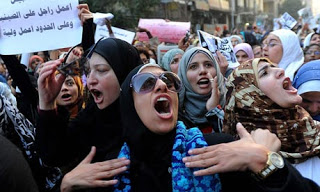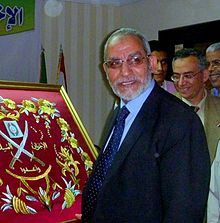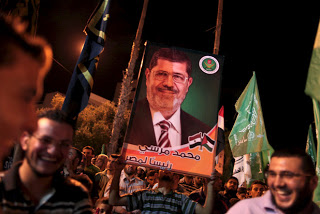The Muslim Brotherhood continues where Mubarak left off – maintaining Israel’s Blockade
 |
| Egyptian women in Cairo march in protest at the military’s use of excessive force against women and unarmed protesters. Photograph: Mohamed Omar/EPA |
 |
| Hamas keeps silent about the betrayal of its fellow Egyptian Muslim Brotherhood |
Egypt’s Muslim Brotherhood has always been a conservative, clerical organisation, representing the interests of the small businessman and capital, whilst being bitterly hostile to the Left. It played a contradictory role with British imperialism until independence and supported the nationalist revolution led by army officers in 1952 only to end up being banned for allegedly trying to murder Gamel Abdel Nasser.
But what is important to understand is that this ‘party of god’ is in reality a reflection of the particular societies in which it operates. So today in Egypt, under MB, it continues the policy of Hosni Mubarak in enforcing the Israeli siege. Indeed in flooding dozens of tunnels in Rafah it is going one step worse than even Mubarak in enforcing Israel’s siege of Gaza.
In the meantime we see the Brotherhood’s commitment to democracy in the assumption by Morsi of dictatorial powers and the continuation by the Police of torture of opponents and the role of the army in upholding the present subservience to the US.
It must therefore be an embarrassment to Hamas, an Israeli created offshoot of Egypt’s Muslim Brother hood, for its sister party to be doing Israel’s work. But then Hamas has only itself to blame. When demonstrators took to the streets in the Arab spring in Tahrir Square, many Gazans came out in the streets to demonstrate in their support. Hamas, just like Fateh and Abbas in Ramallah, used its thugs to drive people back into their homes.
The major conclusion from this is that the Muslim Brotherhood is incapable of leading a revolution against Western imperialism without at the same time seeking to enslave their own people.
Tony Greenstein
Egypt’s Muslim Brotherhood has reneged on promises to Palestine
 |
| Egypt’s new dictator – the Muslim Brotherhood’s Mohammed Morsi |
Amira Howeidy
The Electronic Intifada, Cairo – 21 March 2013
The euphoria that erupted in Gaza minutes after Hosni Mubarak stepped down on 11 February 2011 probably came second only to Egypt’s. The ousted dictator was Israel’s “strategic asset” for good reason. He secured the blockade of the Gaza Strip from the Egyptian side, sided against Hamas and proved a reliable ally.
Even during the 22-day Israeli war on Gaza at the end of 2008, Mubarak kept the Rafah border crossing firmly shut, in violation of the Fourth Geneva Convention which binds Egypt, as a signatory, to protect civilians during times of war and foreign occupation.
Egypt’s dictator was removed but his legacy continues to influence realities on the ground in Gaza and around the Palestinian question in general. It does not help that his successor, the Muslim Brotherhood’s Muhammad Morsi, has done little to prove — thus far — that his policies will change course. Of course nothing is that simple. Morsi, willingly, inherited a difficult legacy of a mammoth, corrupt bureaucracy and questionable sovereignty after decades of subservience to the United States.
But judging from their discourse and performance during the past year, it’s evident that the Brotherhood — including their Freedom and Justice Party and the president — are too eager to prove their power-worthiness by demonstrating “pragmatism” and flexibility to the international community.
Some Brotherhood figures and sympathizers argue that this is vital to securing their ascendance to power in a shaky transition and to quell the fears of skeptics. This might be valid in some cases (where the regional balance of power isn’t in their favor) but it poses compelling questions on how far Morsi will go in Mubarak’s shoes under the pretext of realpolitik — and if he’ll eventually find himself trapped there.
 |
| Morsi – represents a different wing of Egyptian capitalist interests |
Gaza is the barometer
Gaza, which shares a 14-kilometer-long border with Egypt, is probably one of the best barometers for Cairo’s foreign policy independence — or lack thereof.
It’s where Egypt is forced to be involved in the Palestinian question especially since Hamas’s takeover of the strip in 2007 and Israel’s subsequent land, sea and air siege. Under an expired one-year agreement (2005-2006) between Israel, the Palestinian Authority and the European Union, only people (those who are not on Tel Aviv’s blacklist) are allowed though the Egyptian-controlled Rafah border crossing, not goods.
“Approved” commodities are permitted though the Israeli-controlled Karem Abu Salem (Kerem Shalom) crossing. While Egypt wasn’t party to this agreement, it continues to hold it, seven years after it became invalid.
In the language of the Egyptian-Israeli peace agreement, the Egyptian town of Rafah is in Area C — the demilitarized zone in the Sinai peninsula, which strictly limits Egyptian forces to a lightly armed police presence. It’s also the site of hundreds of underground tunnels that link the Palestinian and Egyptian sides of Rafah, which have mushroomed since the Israeli siege of Gaza and provide a lifeline for the strip.
It’s no exaggeration to say that without the tunnels, Gaza’s 1.7-million strong population will suffer, not just because Israel allows only one third of the strip’s needs in via the goods crossings, but also because the vast majority of Gazans can’t afford Israeli products and depend on cheaper Egyptian ones. The resistance also relies on these tunnels (amongst other channels) for much-needed arms.
Because of this and the fact that a largely unmonitored underground world intertwines Gaza with Egypt, the tunnels opportunely surface as a security and political issue for Cairo.
Since the killing of sixteen Egyptian border guards last August in Rafah by still-unknown assailants, the military retaliated by launching “Operation Eagle 2” to purge Sinai of “criminal elements.” None were identified, but the media, in typical Mubarak-era fashion, was quick to blame Palestinians. After shelling mainly desert areas in northeast Sinai the army demolished dozens of tunnels and rounded up “suspects.”
Changes at Rafah crossing
It was the first time that the tunnels were targeted since Morsi came to power. But the impact of the demolitions wasn’t detrimental and the policy was reversed when, after Morsi sacked the military’s top brass, the Rafah border crossing was opened on a daily basis for the first time since the Israeli siege began.
While this was attributed to Morsi’s influence, Hamas officials say that since Mubarak’s ouster and the military’s takeover, the number of Palestinians allowed passage — in the days that the border was open — had increased from approximately 350 or 450 to 1,000, a sign that the generals were slightly less stringent than Mubarak on this issue.
Moreover, the military leadership had given deputy leader of the Hamas politburo Mousa Abu Marzook (previously based in Damascus, along with other with exile resistance factions) permission to live in Cairo, which was unthinkable before the revolution.
The difference since Morsi assumed office has been the daily opening of the crossing, which, by all accounts is a significant development and a far cry from the weeks-long closures that would happen in Mubarak times. Not only is Egypt and thus the rest of the world accessible to most Gazans, Palestine-solidarity delegations from all over the world and high-level state envoys have been visiting the strip regularly, many for the first time, in defiance of the siege and ultimately giving recognition to the Hamas rulers. It’s not what Israel had in mind when it imposed its blockade — which is precisely why Mubarak preserved the siege.
The changes at the crossing are one of the few developments that offer some insight into how Egypt under a Brotherhood president is managing the Palestinian file. There is a difference in modus operandi, but the outcome shows no signs of shaping a new reality. Instead of equating it with Egypt’s other international border crossings, Rafah is still hostage to the Mubarak-era’s calculations and commitments to Israel. It might be open daily, but as per Israel’s demands, Egypt will not allow even a cement bag through, directing goods onto Israeli-controlled Karem Abu Salem.
In the Mubarak continuum, Egypt-Gaza relations and the Palestinian file are still controlled by Egyptian intelligence, who are also involved in the military’s strategy in Sinai and Rafah. The management of the Rafah crossing is completely under the intelligence’s control and run by their mentality and calculations. While Morsi is kept informed, it is unlikely that his views, if any different, will be heeded.
But the Muslim Brotherhood’s media spokesman Gehad El-Haddad claimed to me two weeks ago that the Egyptian intelligence services are “fully under the command” of the president, and executing his orders and vision (“‘We will not let Egypt fall’,” Al-Ahram Weekly, 6 March). And so Morsi “is responsible for what happens on the ground in Rafah.”
Flooding Gaza’s tunnels with sewage
Last month “Operation Eagle 2” resumed tunnel demolitions aggressively, flooding many of them with sewage. More than 400 have been destroyed so far according to military sources cited by the local media. No one will say how far the military is going to go but given previous tunnel demolitions under Mubarak, the operation should be well calculated to leave enough tunnels to smuggle most of Gaza’s needs.
It’s still a disappointing development for Hamas’s leaders who, because of their sensitive situation, will not go on record criticizing Egypt or Morsi. Mousa Abu Marzook would only go as far as saying “We don’t want the tunnels at all, we want the strip’s provisions to go through the Rafah border crossing, which is not happening,” he told me last week.
The only exception, unsurprisingly, is Qatar’s building material, which is allowed passage for the several multi-million dollar reconstruction projects the Gulf state’s Emir Hamad bin Khalifah pledged during his visit to the strip last October. That the first visit by a head of state to the strip is from Qatar reveals more about post-revolution Egypt under a Brotherhood president, than it does about Doha. Qatar is consolidating its already-outsized regional role, while Egypt is treading cautiously within the boundaries placed by Mubarak’s three-decade rule.
Brotherhood spokesman El-Haddad calls this the responsibility of moving from the back seat of the car to the driver’s seat: “When you take the responsibility a lot of calculations happen.” And thus the Camp David peace agreement with Israel that the Brotherhood consistently rejected up to and including their 2010 election platform (which demands under chapter four annulling “all” normalization agreements with Israel and supporting the resistance) will not be broken, or even modified by them (“The electoral platform of the Muslim Brotherhood’s candidates for the 2010 parliament,” Egypt Window, 4 November 2010 [Arabic]).
This is the same statement made by the presidential spokesman last year. Now, in El-Haddad’s words, Camp David is “serving” Egypt’s interests. In the same vein, speaking to Reuters, Essam El-Haddad, Morsi’s aide on foreign relations, justified the flooding of tunnels to stop arms smuggling (“Egypt flooded tunnels to cut Gaza arms flow: aide,” 18 February 2013).
Brotherhood’s shifting position on Palestine
This post-revolution discourse is consistent with the Brotherhood’s new positions, that of its Freedom and Justice Party and Morsi himself. It’s true that the Palestinian question was central to the group’s existence since its early years (their volunteers resisted Zionist gangs in Palestine since 1947) and for decades since. But it’s fair to say that the profile of the Brotherhood’s leadership — a combination of wealth and power — in the past decade is new to the organization’s history.
Their calculations and political priorities are the outcome of their experiences under Mubarak’s rule and should be assessed within that context. In contrast, the group’s base and supporters hail from the middle and lower classes and might not necessarily accept or relate to this level of pragmatism on a central issue like the Palestinian question.
This was partially put to test when Israel launched its brief war on Gaza on 14 November 2012. Morsi first responded by recalling Egypt’s ambassador to Israel on the same day. Facing mounting public pressure, he sent his prime minister in an unprecedented, high-level state delegation to the strip 48 hours later, with the message that official Egypt is taking Gaza’s side.
When compared to Cairo’s accomplice role in the 2008 Gaza war, this development cannot be undermined. So was the direct involvement of both Hamas and Islamic Jihad leaders in the ceasefire discussions with Morsi. Palestinian Authority chairman Mahmoud Abbas was conspicuously absent from the scene.
Morsi wanted to convey to Israel that “today’s Egypt is different from yesterday’s.” That pre-election Israel didn’t want a long war or the long-range missiles which Gaza fired at Tel Aviv and Jerusalem, might have played in Morsi’s favor and driven his point home, not just to Tel Aviv but more importantly his constituency and supporters.
The effect of this test war has since subsided and overshadowed by the aggressive tunnel demolitions and more recently the intense anti-Palestinian, specifically anti-Hamas campaign raging in Egypt for the past week.
On the surface it might seem as a continuation of the Mubarak era demonization of Palestinians in Gaza since Hamas’s takeover of the strip. While military gags were issued to prohibit the press from reporting the numerous times trigger happy Israeli soldiers killed Egyptian border guards, supposedly by mistake, the media seized every opportunity to feed into public opinion that Sinai is Gaza’s aspired alternative state.
Today most media outlets are citing anonymous “military sources” accusing Hamas of murdering the 16 Egyptian border guards last August.
Reports on the confiscation of rolls of fabric used to make the military’s uniform in one of the tunnels is provided as evidence of Hamas or Gaza “elements” involvement in national security threatening activity.
The lack of evidence to substantiate these allegations and the armed force’s deafening silence suggest a deliberate strategy to incite against Hamas, Gaza and the tunnels while linking their alleged transgressions to Morsi and his Brotherhood, the mother organization that inspired the founding of Hamas in 1987. In other words, Morsi’s professed laxity towards his Hamas friends is compromising Egypt’s national security.
This is an oxymoronic situation: Hamas, Gaza and perhaps the Palestinian question as a whole are paying the price for the Brotherhood’s rise to power, when in fact the group, in the name of “pragmatism,” has reneged on previously declared stances related to the Palestinian question.
It’s tempting to assume that Morsi and the Brotherhood are applying a gradual, tactual strategy that will eventually lead to bolder positions. But this is conditional upon guaranteeing, against all odds, that Morsi will at least complete his four-year term and that the conservative reformist mentality of the Muslim Brotherhood will adopt a revolutionary approach towards the issue. The improbability of both is high and like Hamas, the Muslim Brotherhood’s ascendance to power has put to question its raison d’être.
Amira Howeidy is deputy editor of the Cairo-based Al-Ahram Weekly.